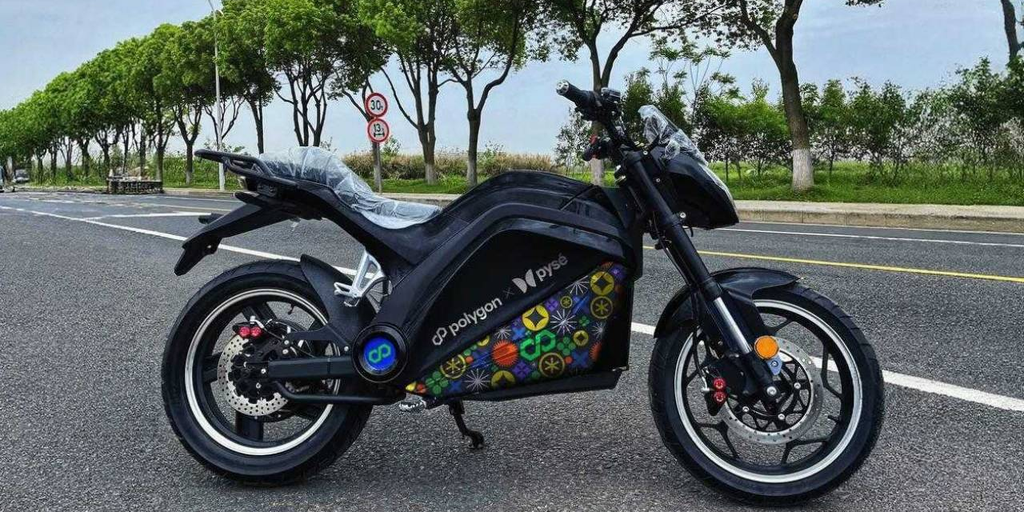
Polygon Labs is moving electric motorcycles on-chain in Dubai—and India might be next.
The Ethereum Layer-2 scaling solution has teamed up with sustainable infrastructure startup Pyse to tokenize a fleet of electric delivery vehicles in Dubai, using Polygon’s blockchain to anchor asset ownership and real-time data collection.
Polygon’s latest foray into tokenized infrastructure seeks to combine stable, revenue-generating electric vehicles with dynamic data monetization, while laying the groundwork for a major expansion into India’s growing electric vehicle (EV) sector.
“One of the biggest focus[es] for Polygon is real-world assets,” Aishwary Gupta, Polygon’s Global Head of Payments and Liquidity, told Decrypt. “And we want to ensure that anything which can be tokenized makes its way to Polygon.”
Putting environmental data on-chain
Each motorcycle is equipped with Pyse’s proprietary DePIN Mining Machine (DMM), turning the vehicle into a data-gathering node while performing routine deliveries.
The device collects urban metrics like air quality, road wear, and noise pollution, and feeds that information on-chain. Rewards are distributed via token incentives verified by partner protocols.
“This is a combination of two worlds,” Harshit Garg, Pyse’s co-founder, told Decrypt. He described the initiative as “real yield through green assets and the speculative upside from decentralized data.”
Garg noted that Pyse is addressing financing gaps in green mobility and also laying the foundation for “infrastructure for a decentralized, data-rich mobility economy.”
This combination of RWA-backed yield and DePIN (Decentralized Physical Infrastructure Network) token incentives allows contributors to earn from both the asset and its data output.
First Dubai, next India
According to the companies, Dubai’s rollout is just the beginning, and India’s electric mobility sector, growing at 18% annually, is the next target.
“India’s B2B EV and last-mile logistics market is fragmented and underfunded,” Garg said, adding that blockchain-backed models could help operators access “funding sources beyond traditional institutions.”
Pyse’s tokenization framework allows for fractional co-ownership of EV assets, with revenue-sharing based on usage and contract terms.
The deployed vehicles already operate under fixed rental agreements in the UAE, anchoring the RWAs with stable returns. At the same time, the DMM adds a speculative layer, minting tokens that can be earned by collecting high-value, verified data.
While India’s crypto regulation remains ambiguous for the time being, Gupta has said that Polygon’s role is infrastructural in this project.
“Polygon is just a blockchain platform where the tokenizing is happening,” he said. “Pyse would be working to ensure compliance.”
Gupta said the company’s infrastructure is evolving to meet the needs of asset classes like tokenized EVs.
“There are a couple of RWA-based L2s using Polygon CDK,” he said. “Lumia and Libre, for example, are RWA-focused CDKs,” referring to custom Layer-2 chains built with Polygon’s Chain Development Kit.
India “ripe” for DePIN
Pyse plans to begin its India expansion with last-mile logistics fleets before moving into ride-hailing and mid-mile delivery.
“The Indian market is ripe for the DePIN segment,” Garg explained. “Given its growing scale in India, the first phase begins with last-mile delivery. The same model can be extended to ride-hailing and first-and-mid-mile delivery segments immediately after.”
Data collected by the DMMs in Dubai is already being provided to insurance companies, OEMs, and logistics providers in exchange for their native tokens.
“Value distribution changes based on the quality of data, usage of the vehicles, etc., and hence is different for each case, Garg said. “However, we make sure that each related party benefits from the DMM layer.”
Gupta explained that this live-use model solves a longstanding problem with RWA implementations. Most tokenized assets to date, like real estate or bonds, are static. Pyse’s model, he said, introduces real-time data collection and yield—a “next phase” for RWAs.
To discourage spam or manipulation, Pyse’s DePIN modules “reward fresh, high-value inputs,” said Garg. “It’s not about volume—it’s about value.”
To ensure integrity, Pyse says its modules are co-developed with vehicle manufacturers and “natively record all data on-chain before any processing.” For DMM modules, “partner protocols independently verify data authenticity before distributing rewards to our nodes.”
In the long term, Pyse wants to build a decentralized “data DAO” to allow stakeholders to govern, monetize, and trade collected data. Garg said demand is already evident across logistics and OEM partners, and that Indian urban data has value “not just locally but across Southeast Asia.”
Gupta sees projects like Pyse’s as a potential gateway for broader blockchain adoption in India, particularly in sectors far beyond finance.
“Pyse’s successful EV tokenization in the UAE is a strong proof of blockchain’s real-world potential,” he said. “Once regulatory frameworks mature in India, this model can become a valuable addition to the country’s growing Web3 ecosystem.”
Daily Debrief Newsletter
Start every day with the top news stories right now, plus original features, a podcast, videos and more.
#Polygon #Pyse #Bring #Tokenized #Fleets #Dubai #Eye #India #Expansion





















